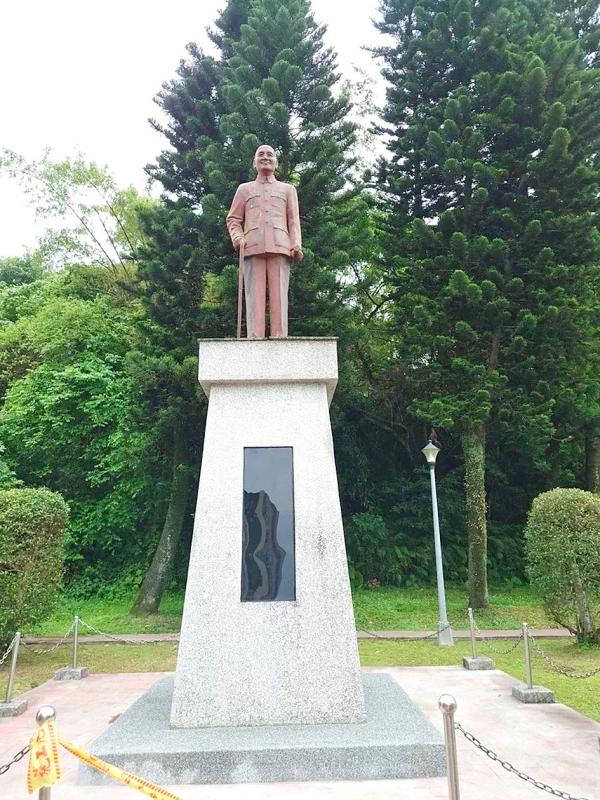Taipei schools do not have to remove statues of Chiang Kai-shek (蔣介石), the city’s Department of Education said last week, despite criticism from the Transitional Justice Commission.
Taipei Department of Education Deputy Commissioner Chen Su-hui (陳素慧) on Tuesday last week said that the city’s policy is to let each school and community decide what to do with the schools’ 64 statues.
Independent Taipei City Councilor Lin Ying-meng (林穎孟) on April 12 said the city was “going through the motions” of transitional justice by covering up slogans on the statues instead of removing them altogether.

Photo courtesy of Taipei City Councilor Lin Ying-meng
Transitional Justice Commission spokeswoman Yeh Hung-ling (葉虹靈) the following day said the city’s “total decontextualization” of the statues is inappropriate under the Act on Promoting Transitional Justice (促進轉型正義條例), which she said requires the city to “remove ... the permanency” of the statues.
The commission should have told the department that its policy was incorrect through official channels before going public, Chen said.
Removal is not the only method of dealing with authoritarian symbols, she said, citing a commission order from July 13 last year that had authorized the city to add text contextualizing the statues, transform them into public art or change the arrangements around the statues.
The city has since removed or obscured with potted plants the authoritarian inscriptions on 41 of the statues, which had text such as “savior of the nation” and “forever remember the leader.”
The department does not consider the 23 other statues authoritarian symbols because they do not bear authoritarian inscriptions or writings of any kind, she said.
“The Taipei City Government is not authoritarian and it will not order schools to dispose of the statues,” she said, adding that “social reconciliation is the true purpose of transitional justice.”
Schools that have decided to remove a statue would be able to do so after the department approves their budget, she said.
Five schools have decided to do so, and officials would help them relocate the statues to Chiang’s Shilin Residence in the city’s Shilin District (士林), she said.
However, Taipei Department of Cultural Affairs Deputy Commissioner Tien Wei (田瑋) said that Chiang’s former residence is a national heritage site, which means any plan to store statues there must receive approval from the Ministry of Culture.
An official at the Taipei Public Works Department’s Parks and Street Lights Office, which manages the Shilin Residence, said the agency needs time to review a plan to store or display the statues, citing concerns for the site’s structural integrity and landscape.

Eight restaurants in Taiwan yesterday secured a one-star rating from the Michelin Guide Taiwan for the first time, while three one-star restaurants from last year’s edition were promoted to two stars. Forty-three restaurants were awarded one star this year, including 34 in Taipei, five in Taichung and four in Kaohsiung. Hosu (好嶼), Chuan Ya (川雅), Sushi Kajin (鮨嘉仁), aMaze (心宴), La Vie by Thomas Buhner, Yuan Yi (元一) and Frassi in Taipei and Front House (方蒔) in Kaohsiung received a one-star rating for the first time. Hosu is known for innovative Taiwanese dishes, while Chuan Ya serves Sichuan cuisine and aMaze specializes

STATS: Taiwan’s average life expectancy of 80.77 years was lower than that of Japan, Singapore and South Korea, but higher than in China, Malaysia and Indonesia Taiwan’s average life expectancy last year increased to 80.77 years, but was still not back to its pre-COVID-19 pandemic peak of 81.32 years in 2020, the Ministry of the Interior said yesterday. The average life expectancy last year increased the 0.54 years from 2023, the ministry said in a statement. For men and women, the average life expectancy last year was 77.42 years and 84.30 years respectively, up 0.48 years and 0.56 years from the previous year. Taiwan’s average life expectancy peaked at 81.32 years in 2020, as the nation was relatively unaffected by the pandemic that year. The metric

Taiwan High Speed Rail Corp. (THSRC) plans to ease strained capacity during peak hours by introducing new fare rules restricting passengers traveling without reserved seats in 2026, company Chairman Shih Che (史哲) said Wednesday. THSRC needs to tackle its capacity issue because there have been several occasions where passengers holding tickets with reserved seats did not make it onto their train in stations packed with individuals traveling without a reserved seat, Shih told reporters in a joint interview in Taipei. Non-reserved seats allow travelers maximum flexibility, but it has led to issues relating to quality of service and safety concerns, especially during

A magnitude 5.1 earthquake struck Chiayi County at 4:37pm today, the Central Weather Administration (CWA) said. The hypocenter was 36.3km southeast of Chiayi County Hall at a depth of 10.4km, CWA data showed. There were no immediate reports of damage resulting from the quake. The intensity of the quake, which gauges the actual effect of a seismic event, measured 4 in Chiayi County, Tainan and Kaohsiung on Taiwan's seven-tier intensity scale, the data showed. The quake had an intensity of 3 in Chiayi City and Yunlin County, while it was measured as 2 in Pingtung, Taitung, Hualien, Changhua, Nantou and Penghu counties, the data